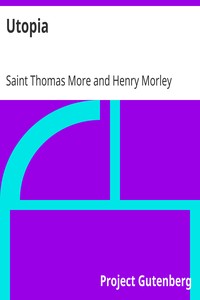Utopia by Saint Thomas More
"Utopia" by Sir Thomas More is a philosophical work written during the early 16th century. The book explores the concept of an ideal society through the dialogues of Raphael Hythloday, who discusses the social, political, and economic structures of the fictional island of Utopia. The text critiques contemporary societal issues in Europe, addressing themes such as justice, property, and governance while proposing radical reforms. The opening of "Utopia" introduces the context in
which the ideas are presented. It begins with a detailed account of Thomas More's life, depicting his upbringing and career, particularly highlighting his relationship with influential figures like Cardinal Morton and Erasmus. The narrative transitions smoothly into Raphael Hythloday’s account after More meets him in Antwerp, where Hythloday reflects on his travels and observations of various nations, leading to a discussion about Utopia's governance and societal norms. The reader is invited to ponder how these reflections on an imaginary society contrast with the political realities of More's time, setting the stage for an in-depth exploration of Utopian ideals. (This is an automatically generated summary.)
Read now or download (free!)
| Choose how to read this book | Url | Size | ||||
|---|---|---|---|---|---|---|
| Read online (web) | https://sendtokindle.compellingsciencefiction.com/ebooks/2130.html.images | 263 kB | ||||
| EPUB3 (E-readers incl. Send-to-Kindle) | https://sendtokindle.compellingsciencefiction.com/ebooks/2130.epub3.images | 171 kB |
Send
to kindle email: |
|||
| EPUB (no images, older E-readers) | https://sendtokindle.compellingsciencefiction.com/ebooks/2130.epub.noimages | 171 kB | ||||
| Kindle | https://sendtokindle.compellingsciencefiction.com/ebooks/2130.kf8.images | 281 kB | ||||
| older Kindles | https://sendtokindle.compellingsciencefiction.com/ebooks/2130.kindle.images | 266 kB | ||||
| Plain Text UTF-8 | https://sendtokindle.compellingsciencefiction.com/ebooks/2130.txt.utf-8 | 256 kB | ||||
| Download HTML (zip) | https://www.gutenberg.org/cache/epub/2130/pg2130-h.zip | 156 kB | ||||
| There may be more files related to this item. | ||||||
Similar Books
About this eBook
| Author | More, Thomas, Saint, 1478-1535 |
|---|---|
| Editor | Morley, Henry, 1822-1894 |
| Title | Utopia |
| Note | Reading ease score: 40.8 (College-level). Difficult to read. |
| Note | Wikipedia page about this book: https: //en.wikipedia.org/wiki/Utopia_(book) |
| Credits | David Price |
| Language | English |
| LoC Class | HX: Social sciences: Socialism, Communism, Anarchism |
| Subject | Utopias -- Early works to 1800 |
| Category | Text |
| EBook-No. | 2130 |
| Release Date | Apr 1, 2000 |
| Most Recently Updated | Apr 7, 2021 |
| Copyright Status | Public domain in the USA. |
| Downloads | 3616 downloads in the last 30 days. |
| Project Gutenberg eBooks are always free! | |

